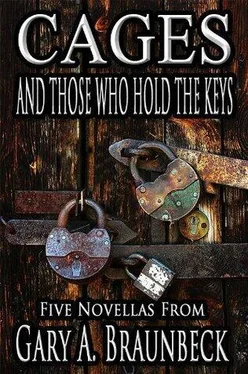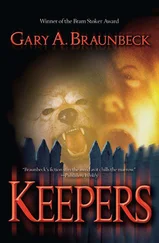I misunderstood something , he thought. I must have misread it.
He set down the crowbar and began to look through his pockets for the letter—he had brought it with him, hadn’t he?—but then dropped the flashlight, which rolled to the side and then around, shining right into his face.
Instinctively, he turned away to shield his eyes from the glare, keeping them closed for a moment until the bright explosions behind his lids lessened, then opening them again—
—his breath caught in his throat—
— you really are a dipshit, sometimes —
—because he’d been looking for a canvas , for something stretched or matted, maybe setting on an easel or hanging on the wall in a frame . . .
. . . but Bob had used the wall itself.
Martin knelt down and fumbled the flashlight into his hand, then stepped back so as to allow the beam to reveal the work in its entirety.
Its sheer size was overwhelming; it reached from one side of the room to the other—easily twelve feet—and rose from floor level to the ceiling—at least seven feet.
Even though he knew time was slipping away, Martin was so stunned by the sight he couldn’t move for several moments.
The painting possessed a dark edginess echoing movements of the past—social realism, German expressionism, Dadaism, surrealism, even a touch of the more recent imagists—yet no one style conflicted with the others; its identity came from an effortless fusion into something that, Martin thought—if it could be labeled at all—might be called “Cumulativism”. It beckoned to him, demanded his awe, his closeness, but as he neared it, at the moment of communion, the faces within seemed to withdraw, distancing themselves from him. Soft shadows of sadness bled from each corner into the center of the painting, creating a disquieting rippling effect, the emotional residue of a broken and embittered heart, searching for a place of healing in a universe that ultimately had no use for either sadness or redemption.
It was the most astonishing thing he had ever seen.
He couldn’t make out the landscape for the crowd of near-life-sized people in the foreground; instead, their shapes seemed to almost be the landscape, with heads in place of hills. Forty faces—he counted them—stared out, their expressions ranging from benevolent acceptance to fury so white-hot you could feel it radiating outward to sear the skin. The faces in front were the most detailed, yet their expressions were the most placid. The faces behind grew less developed the farther back they appeared—many were little more than a few splotches—yet their expressions were instantly recognizable. These faces were thoughtful, their eyes alive: there was a man dressed in an old leather coat, his darkly lustrous face accented by an even darker beard as he stared downward and a little to the right, a shepherd’s cap held in his wind-burnt hands, a man of hushed, gentle resignation, his dignity whispering of well-earned rest, a warm fire waiting at home, and the rich scent of bread baking in the kitchen; behind him stood an exquisite woman in a golden dress that fluttered gently in the breeze, and though her back was turned forward and you saw her face only in profile, it was easy to see the care she took before presenting herself to the world, her delicate hands the ghost of an errant wish—that a woman might never grow old, never lose the radiance that kissed her face when a suitor came to call, never see her beauty dissolve little by little in the unflattering sunlight of each morning, and never know a day when the scent of fresh roses from an admirer did not fill her rooms; next to her stood a bittersweet girl with long dark hair tumbling about her shoulders, her face seemingly held in a velvet cradle, a hand covering her mouth, eyes with sad dark places around them that told you she often hid behind a scrim of gaiety to conceal a lonely heart; she was every night you sat isolated and alone, wishing for the warm hand of a lover to hold in your own as autumn dimmed into winter and youth turned to look at you over its shoulder and smile farewell.
A single, hard, unnoticed tear spilled from Martin’s eye, trailing down his cheek.
“‘ To take into the air my quiet breath . . .’” he whispered. “‘ To cease upon the midnight with no pain . . . .’”
Above all these face was an agate sky that warned of the coming storm; a cold veil of rain approached from the upper right side, a sprinkle becoming mist becoming a terrible cloud formation that erupted across the top of the scene to cover nearly one-fifth of the entire painting: swirling black tinged with grey and purple, its mass thinning somewhat as it spread outward to form the shadow of a great, winged creature.
Martin shook himself from a sudden chill, stepped back once more, then gave the painting one last look.
“Okay,” he whispered to the emptiness. “I found the painting. Now where’s the goddamn key ?”
A voice behind him said, “‘The world is a stone, soldier . . .’”
Martin whirled around to find himself once again face to face with the six-year-old boy he’d once been. “ Jesus Christ , scare me to death, why don’t you?”
“Sorry.”
“What are you doing here, any—?”
You’ll know the key when you find it—or when it finds you.
Martin smiled. “It’s you , isn’t it? You’re the key!”
The little boy shook his head.
Martin’s heart sank. “Then why are you here?”
“‘ The world is a stone, soldier . . .’” “You already said that; repeating it doesn’t help me.” “You have to remember.” “Remember what?”
The little boy shook his head and released one those deeply dramatic sighs of which only children are capable, then said: “When you bought him that hot dog and soda that day, you said that you’d once been a writer. He asked what kind of stuff you wrote and you told him stories and books and a few—”
“. . . a few lousy poems,” said Martin. “Yeah . . . I think I remember saying something like that.”
“He said that there was no such thing as a lousy poem, only lousy poets.”
Martin laughed. “That’s right! I remember really liking that line.”
The little boy nodded. “You said you might use that sometime, and he said you could have it . . . for the price of a poem.”
Something in the back of Martin’s mind was stirring beneath its covers. “Yeah . . . that’s right . . . that’s what he said.”
“And you recited one for him, and he loved it. He loved it so much that it gave him an idea.” The boy nodded toward the painting. “He painted that because of you, because of the poem you recited to him. You were the inspiration.
“You’ve forgotten too many of the good things, Martin. You only see your mistakes.
“The admission to the Midnight Museum is that poem. That’s the key. It was one of the many good things about yourself that you’ve forgotten.”
Martin knelt down in front of the boy. “Where did you come from? Did Bob or Jerry send you?”
The little boy shook his head.
“Then how did you get here?”
“With you. I’ve always been with you. You just forgot about me. I got out the other night, after you took the first bunch of pills. I didn’t want to die just because you did. Dumb bunny.”
“I’m . . . I’m sorry.”
The little boy reached out and put his hand on Martin’s shoulder. “You don’t have to be sorry about anything, not anymore.”
“Why?”
“Because Mom and Dad still love you, they always did and always will, and because . . .‘The world is a stone, soldier . . .’”
Читать дальше












